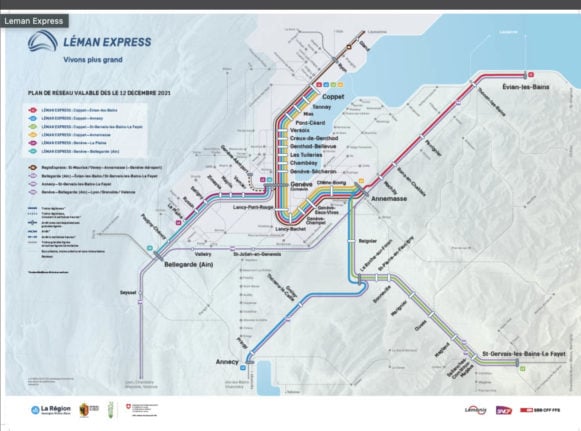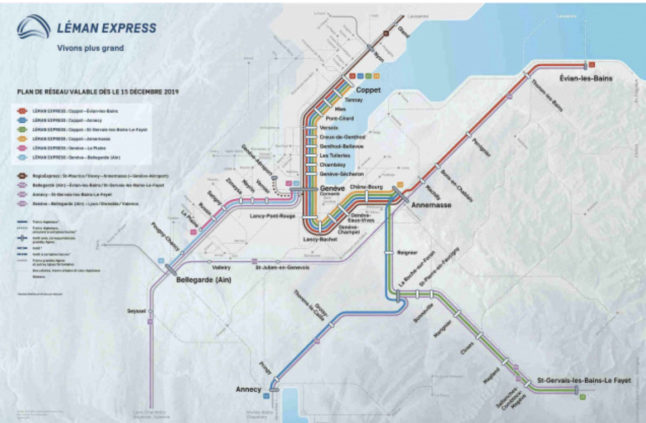A commuter rail link between Switzerland and France has caused property prices on both sides of the border to rise sharply.
When the Léman Express (LEX) was inaugurated in December 2019, its main goal was to connect the Geneva region with neighbouring French towns and provide a quicker commute for cross-border workers.
Established by the Swiss (SBB) and French (SNCF) railway companies, LEX is Europe’s largest cross-border regional rail network.
Some of the approximately 92,000 employees from France commute to their jobs in the Lake Geneva region by car, while others prefer to take Léman Express, which was launched specifically to reduce journey times and cut traffic in and around Geneva.
But while this goal has been largely achieved – the train carries 52,000 passengers a day — the rail link is also causing rents and property prices in the vicinity of the train’s 45 stations to soar by 8 to 9 percent on average — a sharper increase than elsewhere in the region.
Prices rose in the French departments of Haute-Savoie and Ain, as well as in Swiss cantons of Geneva and Vaud, all of which lie along Léman Express’ 230-km track, according to Tribune de Genève (TDG).
Screenshot Léman Express
Why has this happened ?
As a general rule, transport infrastructure influences real estate prices, according to Dragana Djurdjevic, statistician at Wüest Partner real estate consultants interviewed by TDG.
Increases vary based on the type of transport —such as trains, buses or trams — as well as the frequency and the distance of the property to the nearest stop.
Typically, prices / rents are the highest within 300 metres around a station.
In general, Swiss and French municipalities with a LEX station have recorded significantly higher rents and sale prices than areas that have no access to the train, Djurdjevic said.
Just how much have prices increased along the LEX line?
On the Swiss side, rents rose by 4.9 percent along the track. In Geneva itself (already the most expensive rental market) , they went up by 1.5 percent, and only slightly less (1.4 percent) in Vaud.
READ MORE: Why is Geneva’s rent the highest in Switzerland?
In terms of properties, prices along the network rose by 17.7 percent; in Geneva the increase is 12.3 percent, and 13 percent in Vaud.
In neighbouring France, rents increased by 6.1 percent along LEX stops. In Haute-Savoie, the increase is 6.3 percent and in Ain 9.1 percent.
Sale prices went up by 15.7 percent along the track, 14.8 percent in Haute-Savoie and 23.7 percent in Ain.
The cost of riding the Léman Express, a regional train that connects border areas of Switzerland and France, will likely go up in 2023.
Europe’s largest cross-border rail network, which is widely used by French workers who commute to their jobs in the Lake Geneva region, could increase the prices of passes and single journey-tickets by about 3 and 8 percent, respectively.
It is not yet clear exactly how much more the commuters in each tariff zone along the 230 km of track will have to pay, or when the hike will go into effect — on January 1st or later in 2023.
More information about the current tickets and passes can be found here.
A collaboration between the Swiss Federal Railways (SBB) and France’s SNCF, the Léman Express network of 40 trains spans 45 stations between the Swiss cantons of Geneva and Vaud and the French departments of Ain and Haute-Savoie.
Léman Express’ cross-border network. Image: Léman Express, Courtesy SBB
More than 57,000 people use this train every day.
The network was inaugurated in December 2019 with the goal of reducing journey times and cutting traffic in and around Geneva, while allowing thousands of cross-border workers from France to quicker access their Swiss jobs.
Beyond its primary task of transporting commuters and reducing traffic congestion around Geneva, Léman Express’ goal is also to create a sense of regional identity which spans cantonal and national borders.
However, the network has also had a less beneficial effect on the region’s residents: it has caused rents and property prices on both sides of the border to rise sharply.
These costs have risen by 8 to 9 percent on average — a sharper increase than elsewhere in the region.
READ MORE: How a cross-border train has pushed house prices up in Switzerland and France
So this website can function correctly please whitelist The Local with your adblocker, antivirus software or browser add on.
Please visit the help centre for more information